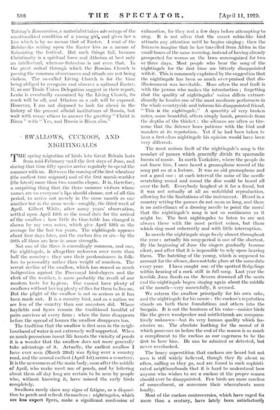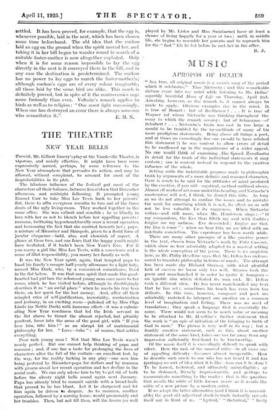SWALLOWS, CUCKOOS, AND NIGHTINGALES
THE spring migration of birds into Great Britain lasts from mid-February until the first days of June, and during that time fifty species arrive regularly to spend the summer with us. Between the coming of the first wheatear (the earliest true migrant) and of the first marsh-warbler (the latest) more than two months elapse. It is, therefore, a surprising thing that the three summer visitors whose names arc on everyone's lips should choose, out of all this period, to arrive not merely in the same month as one another but in the same week—roughly, the third week of April. Gilbert White, after many years' observation, settled upon April 13th as the usual date for the arrival of the swallow : how little its time-table has changed is shown by my own notes, which give April 13th as the average for the last ten years. The nightingale appears about four days later, and the cuckoo five or six--by the 20th all three are here in some strength.
Not one of the three is exceedingly common, and one, the nightingale, is altogether unknown over more than half the country : they owe their predominance in folk- lore to personality rather than weight of numbers. The recent decline of the swallow, which has caused so much indignation against the Provencal bird-slayers and the clerk of the weather, is more probably the result of our modern taste for hygiene. One cannot have plenty of swallows without having plenty of flies for them to live on. But the plight of the swallow is not so serious as it has been made out. It is a country bird, and as a nation we see less of the country than our ancestors did. Where hayfields and byres remain the traditional handful of pairs survives at every farm : when the farm disappears before the spread of houses the swallow disappears too.
The tradition that the swallow is first seen in the neigh- bourhood of water is not extremely well supported. When so much precocious insect life haunts the vicinity of ponds it is a wonder that the swallow does not more generally take advantage of it. Actually, the earliest swallow I have ever seen (March 23rd) was flying over a country road, and the second earliest (April 1st) across a cemetery. It is the newcomers of the main body, soon after the middle of April, who make most use of ponds, and by loitering about them all day long are certain to be seen by people who, without knowing it, have missed the early birds completely.
Swallows rarely show any signs of fatigue, or a disposi- tion to perch and refresh themselves : nightingales, which are less expert flyers; make a significant confession of exhaustion, for they rest a few days before attempting-to sing. It is not often that the russet robin-like bird attracts any attention until he begins singing ; then the listeners imagine that he has travelled from Africa in the small hours of the same morning, instead of having already prospected for worms on the lawn unrecognized for two or three days. Most people who hear the song of the nightingale for the first time are bitterly disappointed with it. This is commonly explained by the suggestion that the nightingale has been so much over-praised that dis- illusionment was inevitable. More often the real fault is with the person who makes the introduction ; forgetting that the quality of nightingales' voices differs extraor- dinarily he locates one of the most mediocre performers in the whole countryside and informs his disappointed friend, " This is the nightingale." A quantity of very broken notes, some beautiful, others simply harsh, proceeds from the depths of the thicket : the silences are often so tire- some that the listener loses patience with the bird and wonders at its reputation. Yet if he had been taken to hear a first-class nightingale his opinion would have been very different.
The most serious fault of the nightingale's song is the number of pauses which generally divide its spasmodic bursts of music. In north Yorkshire, where the people do not know him, I once heard a gramophone record of the song put on at a lecture. It was an old gramophone and not a good one : at each interval the noise of the needle scratching round and round the disc could be heard all over the hall. Everybody laughed at it for a fraud, but it was not actually at all an unfaithful reproduction, allowing for the limitations of the instrument. -Heard in a country setting the pauses do not seem so long, and there is no anti-climax of a droning needle to point the moral that the nightingale's song is not so continuous as it might be. The best nightingales to listen to are not always those with the most perfect voices, but those which sing most coherently and with little interruption.
In novels the nightingale sings freely almost throughout the year : actually his song-period is one of the shortest. By the beginning of June the singers gradually become silent, and after that it is impossible to rely upon hearing them. The hatching of the young, which is supposed to account for the silence, does not take place at the same date every year. I have caught one of the spotted fledgelings within hearing of a cock still in full song.. Last year the terrible June floods on the Severn drowned all the nests and the nightingale began singing again about the middle of the month—very mournfully, it seemed.
We esteem the swallow principally for his own sake, and the nightingale for his music : the cuckoo's reputation stands on both these foundations and others into the bargain. It is not the loudness of his voice—noisier birds like the green woodpecker and mistlethrush are compara- tively unknown—but its very human quality which fas- cinates us. The absolute loathing for the sound of it which possesses us before the end of the season is as much a compliment to the cuckoo as our eagerness to be the first to hear him. He can be admired or detested; but never overlooked.
The hoary superstition that cuckoos are heard but not seen is still widely believed, though they fly about so often, calling as they go, and are found in such sophisti- cated neighbourhoods that it is hard to understand how anyone who wishes to see a cuckoo at the proper season should ever be disappointed. Few birds are more careless of concealment, or announce their whereabouts more loudly.
Most of the cuckoo controversies, which have raged fox more than a century, have lately been satisfactorily settled. It has been proved, for example, that the egg is, whenever possible, laid in the nest, which has been chosen sonic time beforehand. The old idea that the cuckoo laid an egg on the ground when the spirit moved her, and taking it in her bill began to wander round in search of a suitable foster-mother is now altogether exploded. Only when it is for some reason impossible to lay the egg directly in the nest is it conveyed there in the bill, and in any case the destination is predetermined. The cuckoo has no power to lay eggs to match the foster-mother's ; although cuckoo's eggs are of every colour imaginable, all those laid by the same bird are alike. This much is definitely proved, but in spite of it the controversies rage more furiously than ever. Voltaire's remark applies to birds as well as to religion : " One must fight unceasingly. When one has destroyed an error there is always someone











































 Previous page
Previous page